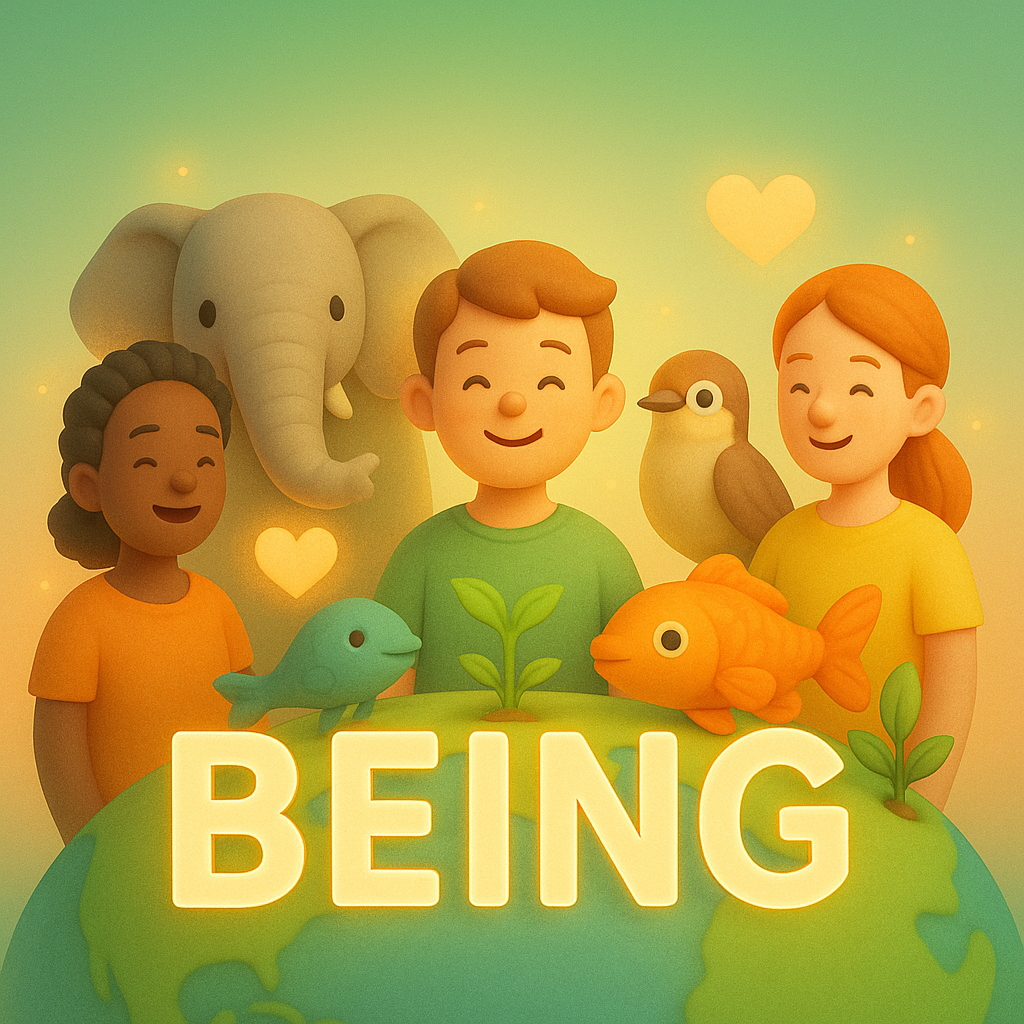Being
Definition
Being is a noun and a present participle of the verb "to be." As a noun, it refers to existence, life, or a living entity. It can also mean the essential nature of something. As a present participle, it denotes the state of existing or occurring.
Parts of Speech
- Noun
- Verb (present participle)
Pronunciation
American English
- IPA Pronunciation: /ˈbiɪŋ/
- Respelling: BEE-ing
British English
- IPA Pronunciation: /ˈbiːɪŋ/
- Respelling: BEE-ing
Etymology
The word "being" originates from the Old English "beon," meaning "to be, exist, or become." It has Proto-Germanic roots in "*beunam," related to the concept of existence and life.
Derivatives
- Be (verb)
- Becoming (noun/adjective)
- Well-being (noun)
- Human being (noun)
- Beingness (noun)
Synonyms
- Existence
- Entity
- Presence
Antonyms
- Nonexistence
- Nothingness
- Void
Usage
The term "being" is used to denote life, existence, or presence. It is often employed in philosophical, spiritual, and existential contexts. For example, "She is a compassionate being," or "The concept of being and non-being has been debated for centuries."
Related Terms
- Existence: The state of being or existing.
- Consciousness: The state of being aware and able to think.
- Life: The quality that distinguishes living organisms from inanimate matter.
Detailed Definitions
Noun
- The state of existing: Refers to the condition of having existence or life.
- Example: "The concept of being is central to philosophy."
- A living entity or organism: Describes a creature with life, often used to refer to humans or conscious beings.
- Example: "Every being on the planet has intrinsic value."
- The essential nature or essence of something: Refers to the core quality or existence of an entity or idea.
- Example: "The book explores the being of the human soul."
Verb (present participle)
- The act of existing or living: Indicates the ongoing state of life or occurrence.
- Example: "Being happy is important for mental health."
being



🇨🇳 Mandarin (Simplified Chinese)
- 存在 (Existence)
- IPA: /tsʰuən˥˩ ʂiŋ˥˩/
- Respelling: chuán xìng
- 生物 (Creature)
- IPA: /ʂəŋ˥ wu˧˥/
- Respelling: shēng wù
🇮🇳 Hindi
- अस्तित्व (Existence)
- IPA: /əstɪt̪ʋ/
- Respelling: astittva
- प्राणी (Creature)
- IPA: /praːɳiː/
- Respelling: prāṇī
🇪🇸 Spanish
- Ser (Being as existence)
- IPA: /ser/
- Respelling: ser
- Criatura (Creature)
- IPA: /kɾjaˈtuɾa/
- Respelling: criatura
🇫🇷 French
- Être (Being as existence)
- IPA: /ɛtʁ/
- Respelling: être
- Créature (Creature)
- IPA: /kʁe.a.tyʁ/
- Respelling: créature
🇦🇪 Modern Standard Arabic
- وُجود (Existence)
- IPA: /wuʤuːd/
- Respelling: wujūd
- كائن (Creature)
- IPA: /kaː'in/
- Respelling: kā'in
🇧🇩 Bengali
- অস্তিত্ব (Existence)
- IPA: /ɔstitːɔb/
- Respelling: ostittô
- প্রাণী (Creature)
- IPA: /praːni/
- Respelling: prāṇī
🇷🇺 Russian
- бытие (Being as existence)
- IPA: /ˈbɨtʲɪje/
- Respelling: bytiye
- существо (Creature)
- IPA: /ˈsuʂɨstvə/
- Respelling: sushchestvo
🇵🇹 Portuguese
- Ser (Being as existence)
- IPA: /sɛʁ/
- Respelling: ser
- Criatura (Creature)
- IPA: /kɾi.aˈtu.ɾɐ/
- Respelling: criatura
🇮🇩 Indonesian
- Keberadaan (Existence)
- IPA: /kəbə'radan/
- Respelling: keberadaan
- Makhluk (Creature)
- IPA: /'mɑxlʊk/
- Respelling: makhluk
🇩🇪 German
- Sein (Being as existence)
- IPA: /zaɪ̯n/
- Respelling: sein
- Kreatur (Creature)
- IPA: /kʁeˈaːtuːɐ̯/
- Respelling: kreatur
🇯🇵 Japanese
- 存在 (Existence)
- IPA: /soⁿzai/
- Respelling: sonzai
- 生物 (Creature)
- IPA: /seɪbʊtsʊ/
- Respelling: seibutsu
🇻🇳 Vietnamese
- Sự tồn tại (Existence)
- IPA: /ɕɯ̂ˀ ʈəːn taːj˨˩/
- Respelling: sự tồn tại
- Sinh vật (Creature)
- IPA: /ɕɪŋ˧˥ vaːt˧˥/
- Respelling: sinh vật
🇰🇷 Korean
- 존재 (Existence)
- IPA: /t͡ʃon.d͡ʑɛ̝/
- Respelling: jonjae
- 생물 (Creature)
- IPA: /sʰaŋ.mul/
- Respelling: saengmul
🇹🇷 Turkish
- Varlık (Existence)
- IPA: /vɑɾˈlɯk/
- Respelling: varlık
- Yaratık (Creature)
- IPA: /jaˈɾatɯk/
- Respelling: yaratık
🇵🇰 Urdu
- وجود (Existence)
- IPA: /vuːdʒuːd/
- Respelling: vujūd
- مخلوق (Creature)
- IPA: /mʌxluːq/
- Respelling: makhlooq





